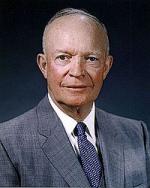Disable ads!
Dwight D. Eisenhower
Dwight David "Ike" Eisenhower (pronounced /ˈaɪzənhaʊər/, EYE-zən-how-ər; born David Dwight Eisenhower; October 14, 1890 – March 28, 1969) was the 34th President of the United States from 1953 until 1961. He was a five-star general in the United States Army during World War II and served as Supreme Commander of the Allied Forces in Europe; he had responsibility for planning and supervising the invasion of North Africa in Operation Torch in 1942–43 and the successful invasion of France and Germany in 1944–45 from the Western Front. In 1951, he became the first supreme commander of NATO. He was the last U.S. President to have been born in the 19th century. Eisenhower was of Pennsylvania Dutch ancestry and was raised in a large family in Kansas by parents with a strong religious background. He attended and graduated from West Point and later married and had two sons. After World War II, Eisenhower served as Army Chief of Staff under President Harry S. Truman then assumed the post of President at Columbia University. Eisenhower entered the 1952 presidential race as a Republican to counter the non-interventionism of Senator Robert A. Taft and to crusade against "Communism, Korea and corruption". He won by a landslide, defeating Democratic candidate Adlai Stevenson and temporarily upending the New Deal Coalition. In the first year of his presidency, Eisenhower deposed the leader of Iran in the 1953 Iranian coup d'état and used nuclear threats to conclude the Korean War with China. His New Look policy of nuclear deterrence gave priority to inexpensive nuclear weapons while reducing the funding for conventional military forces; the goal was to keep pressure on the Soviet Union and reduce federal deficits. In 1954, Eisenhower first articulated the domino theory in his description of the threat presented to United States' global economic and military hegemony by the spread of communism and anti-colonial movements in the wake of Communist victory in the First Indochina War. The Congress agreed to his request in 1955 for the Formosa Resolution, which obliged the U.S. to militarily support the pro-Western Republic of China in Taiwan and take a hostile position against the People's Republic of China on the Chinese mainland. After the Soviet Union launched the world's first artificial satellite in 1957, Eisenhower authorized the establishment of NASA which led to a "space race". Eisenhower forced Israel, the UK, and France to end their invasion of Egypt during the Suez Crisis of 1956, while simultaneously condemning the Soviet invasion of Hungary during the Hungarian Revolution of 1956. In 1958, he sent 15,000 U.S. troops to Lebanon to prevent the pro-Western government from falling to a Nasser-inspired revolution. Near the end of his term, his efforts to set up a summit meeting with the Soviets collapsed because of the U-2 incident. In his 1961 farewell address to the nation, Eisenhower expressed his concerns about future dangers of massive military spending, especially deficit spending and government contracts to private military manufacturers, and coined the term "military–industrial complex". On the domestic front, he covertly opposed Joseph McCarthy and contributed to the end of McCarthyism by openly invoking the modern expanded version of executive privilege. He otherwise left most political activity to his Vice President, Richard Nixon. He was a moderate conservative who continued New Deal agencies and expanded Social Security. Among his enduring innovations, he launched the Interstate Highway System; the Defense Advanced Research Projects Agency (DARPA), which led to the internet, among many invaluable outputs; the National Aeronautics and Space Administration (NASA), driving peaceful discovery in space; the establishment of strong science education via the National Defense Education Act; and encouraging peaceful use of nuclear power via amendments to the Atomic Energy Act. In social policy, he sent federal troops to Little Rock, Arkansas, for the first time since Reconstruction to enforce federal court orders to desegregate public schools. He also signed civil rights legislation in 1957 and 1960 to protect the right to vote. He implemented desegregation of the armed forces in two years and made five appointments to the Supreme Court. He was the first term-limited president in accordance with the 22nd Amendment. Eisenhower's two terms were peaceful ones for the most part and saw considerable economic prosperity except for a sharp recession in 1958–59. Eisenhower has consistently been ranked by scholars as one of the greatest U.S. Presidents.
 Read more on wikipedia.org Read more on wikipedia.org
 All quotes by Dwight D. Eisenhower All quotes by Dwight D. Eisenhower
 Edit Edit
|

|
|
|
|
|
Background photo by Giuliana
|